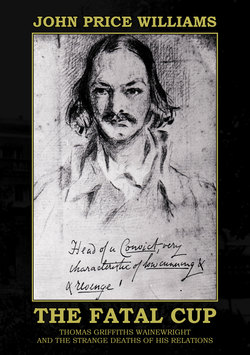Читать книгу The Fatal Cup: Thomas Griffiths Wainewright and the strange deaths of his relations - John Price Williams - Страница 54
На сайте Литреса книга снята с продажи.
Оглавлениеgrandfather’s trust fund. There was now nothing left for Eliza after his death or for any child of their marriage. But then he and Eliza had been married for several years, and there was no sign of any offspring.
He was, however, taking a terrible risk, the penalty for such forgery was death by public execution, and a few months after his last visit to the Bank came a cause célèbre which must have caused him considerable disquiet - the case of the city banker Henry Fauntleroy, who had also forged powers of attorney and defrauded the Bank of England, just as Wainewright had done.
Newspaper stories reported Fauntleroy’s dissolute life with vast sums spent on women and gambling. But a confession found in a tin box at the bank in which he was a partner, said he had done it to keep his own bank going and blamed the Bank of England for rejecting his payments and refusing him credit. “They shall smart for it”, he wrote. The confession was found by Freshfields the Bank of England solicitors, who were to pursue Wainewright many years later.
On November 2, 1824, at the Old Bailey, Fauntleroy was convicted of forging powers of attorney to secure £170,000, though the real figure was said to be £400,000. The case attracted enormous public attention and sympathy for Fauntleroy, but despite 16 character witnesses, he was sentenced to death and on November 30 he was hanged in front of the debtor’s door at Newgate Prison.
There had been a series of petitions and appeals to no avail; an Italian was said to have offered to take his place on the scaffold; another tale said
THE FATAL CUP
54
